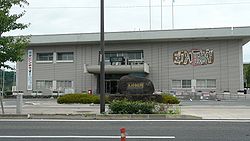Ōmura, Nagasaki
|
Ōmura 大村市 |
||
|---|---|---|
| City | ||
 |
||
|
||
 Location of Ōmura in Nagasaki Prefecture |
||
| Location in Japan | ||
| Coordinates: 32°54′0″N 129°57′30″E / 32.90000°N 129.95833°ECoordinates: 32°54′0″N 129°57′30″E / 32.90000°N 129.95833°E | ||
| Country | Japan | |
| Region | Kyushu | |
| Prefecture | Nagasaki Prefecture | |
| Government | ||
| • Mayor | Takashi Matsumoto (since April 1987) | |
| Area | ||
| • Total | 126.34 km2 (48.78 sq mi) | |
| Population (2015) | ||
| • Total | 93,921 | |
| • Density | 710/km2 (1,800/sq mi) | |
| Symbols | ||
| • Tree | Quercus gilva | |
| • Flower | Omura sakura | |
| Time zone | Japan Standard Time (UTC+9) | |
| City hall address | 1-25 Kushima, Omura-shi, Nagasaki-ken 856-8686 |
|
| Website | www |
|
Ōmura (大村市 Ōmura-shi?) is a city located in Nagasaki Prefecture, Japan.
As of April 1, 2015, the city has an estimated population of 93,921 and a population density of 710 persons per km². The total area is 126.33 km², and includes Nagasaki Airport.
Ōmura is a castle town, and was the capital of Ōmura Domain, ruled by the local Ōmura clan for over 900 years in pre-Meiji Japan. It was the site of considerable foreign trade and missionary activity during the late Muromachi period, and the Catholic saint Marina de Omura hails from this city. Due to its proximity to the trading settlement at Dejima in Nagasaki, was one of the first areas of Japan to re-open to foreign contact after the end of the national seclusion policy after the Meiji Restoration. In the opera Madama Butterfly, set in nearby Nagasaki, the place name Omara in the line "ed alla damigella Butterfly del quartiere d'Omara Nagasaki" probably refers to Ōmura. From 1868-1945, Ōmura was host to numerous military facilities as part of the Sasebo Naval District, most notably that of a major air base for the Imperial Japanese Navy Air Service. The former naval base was the location of the squalidŌmura Migrant Detention Center, where mainly Korean refugees—termed "stowaways" (mikkōsha synonymous with "smuggler")—were held until deportation, frequently for several years. Since August 1996 the nearby Ōmura Immigration Reception Center in a modern building serves the same function.
...
Wikipedia


